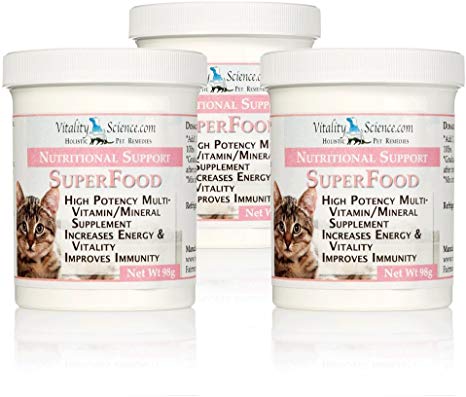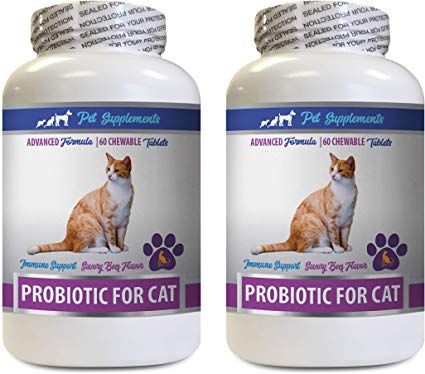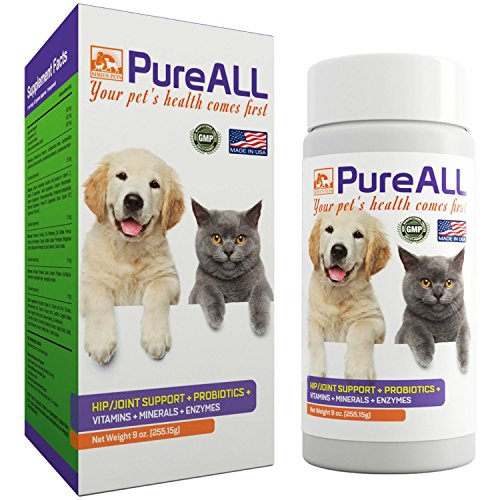
Learn all about Cat Vitamins and Minerals for Your Cat
Vitamin Vitality for Your Cat (Cat Vitamins)
In the ongoing quest for better health, a vast array of cat vitamins and supplements support a multi-billion dollar global industry – for humans, that is. If people spend so much to improve their own health, should cats receive health-boosters, too? After all, we all want our cats to live long and healthy lives.
Recommended Daily Allowance for Cats
Cats do need a minimum level of vitamins and nutrients, and these recommended daily allowances are set forth by the Association of Animal Feed Control Officials (AAFCO). The list specifies the appropriate intake of nutrients such as protein, amino acids such as valine for muscle metabolism and histidine for tissue repair, and minerals such as phosphorus, sodium, and potassium.
The average healthy cat gets these minimum recommended levels simply by eating a high-quality, AAFCO-approved commercial cat food.

“If cats are consuming a commercial pet food that’s labeled ‘complete and balanced,’ they’re probably taking in a much better-balanced diet than you or I,” says Sherry Sanderson, DVM, an associate professor at University of Georgia College of Veterinary Medicine. “All the cat vitamins and minerals that they need are going to be in that complete and balanced food.”
The cat food label should include an AAFCO statement saying how the “complete and balanced” determination was substantiated. “There are two ways they can be substantiated,” Sanderson says. “One is by actually feeding it to animals, or they can look up the nutrients on a table — it’s really better to choose the one that’s been fed to animals, and it will say that on the label.”
“Unless there’s some other underlying condition going on with the cat, it’s not necessary to supplement them with a vitamin-mineral supplement as with people,” she says. So while most cats don’t need additional nutrition, some cats might benefit from it.
When to Supplement“Your cat is not necessarily the typical cat,” says Roger Kendall, vice president of research and development at Pet Naturals of Vermont. “It may be older, it may be genetically predisposed to certain other conditions where nutrition supplements can support that, or in fact, their diet may not have enough of a particular mineral or cat vitamins.” In these cases, as with kittens, pregnant cats or cats with illnesses such as arthritis or renal failure, adding vitamins or nutrients might be just what the veterinarian ordered.
Different levels of Nutrition for Cat
Three different levels of nutrition come into play during a cat’s life, according to Kendall. The first, basic nutritional level can be met through over-the-counter cat food that meets AAFCO requirements. “The second level is called preventative nutrition, which is adding nutrition or supplements to the basic diet to eliminate possible deficiencies caused by the diet,” Kendall says.
“There are no symptoms, but basically you are giving nutrients that research studies show will help support a particular function or structure. The goal is to prevent the onset of diseases as the cat gets older.” The third level, therapeutic nutrition, uses supplements in animals that are beginning to display health problems or issues, he explains.
A number of common conditions might improve as a result of adding supplements, according to Kendall. If a cat has diarrhea, or in more rare cases, constipation, digestive enzymes or probiotics may be in order. Probiotics include the many beneficial bacteria in a healthy cat’s intestinal tract. “Probiotics are a growing area in veterinary medicine, and there’s not a lot of research on it in cats, but the research that has been done has shown there are benefits similar to those seen in people who take them, so even healthy animals can benefit from probiotics if they’re the right probiotics,” Sanderson says.
Which Supplements to Choose for your cat

In addition, “essential fatty acids such as fish oil are very important for the luster of the coat and skin of the animal,” Kendall notes. Cats feeling the pain of arthritis benefit from glucosamine, while antioxidants can help alleviate symptoms from conditions such as liver problems. And even a cat’s age affects its nutritional requirements. “Kittens have a little higher protein and fat requirements,” Sanderson says. Most commercial foods specially formulated for kittens account for these increased levels.
“Some supplements that are OK for people to take could potentially cause problems in cats. You have to be careful of what supplements you give,” Sanderson explains. She advises working through a local veterinarian to identify the appropriate supplements to give.
In addition, ensure supplement quality by looking for a stamp of approval on the product from the National Animal Supplement Council. “Seeing the NASC label on a product is step one,” says Kendall, who is affiliated with the NASC. Currently, more than 100 companies belong to the NASC, providing “products based on quality, purity, identification, safety, research, clinical studies where available, consistency, and from the standpoint of a well-regulated domain,” Kendall explains.
People want their cats to live quality lives and provide years of companionship. While the average cat may not need supplements outside their normal diets, some cats might. “Supplementation is in the eye of the beholder,” Kendall says. “People have trouble when they go and try to do it on their own. They need to educate themselves first. Go to the web, get books, know when and how to supplement.
And as Sanderson suggests, involve a local veterinarian. Each cat has individual needs, and making an effort to understand those needs prior to purchasing supplements may be as important as the supplements themselves.
